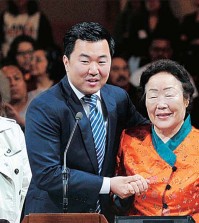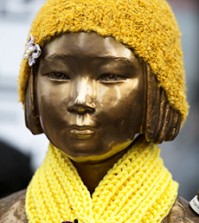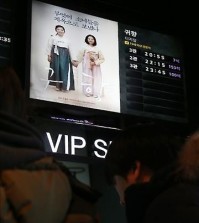- California Assembly OKs highest minimum wage in nation
- S. Korea unveils first graphic cigarette warnings
- US joins with South Korea, Japan in bid to deter North Korea
- LPGA golfer Chun In-gee finally back in action
- S. Korea won’t be top seed in final World Cup qualification round
- US men’s soccer misses 2nd straight Olympics
- US back on track in qualifying with 4-0 win over Guatemala
- High-intensity workout injuries spawn cottage industry
- CDC expands range of Zika mosquitoes into parts of Northeast
- Who knew? ‘The Walking Dead’ is helping families connect
DC Korean Americans to stand in protest against Abe in a call for apology
By The Korea Times Washington DC staff
The Korean American community in Washington, D.C., have gathered this week to request a long-ignored apology from visiting Japanese Prime Minister Shinzo Abe, who will meet President Barack Obama Tuesday and give an unprecedented speech, for a Japanese leader, to a joint session of the U.S. Congress on Wednesday.
Led by the Washington Coalition for Comfort Women Issues, about 30 organizations will protest in front of Capitol Hill Tuesday and Wednesday.
They seek an apology for Japan’s wartime history, in particular its soldiers’ use of “comfort women,” or sex slaves, during the second World War.
Abe, who has refused to directly address the issue, referred to comfort women as victims of human trafficking during a speech Monday at Harvard University.
“My heart aches when I think about the people who were victimized by human trafficking and who were subject to immeasurable pain and suffering, beyond description. On this score my feeling is no different from my predecessor prime ministers,” Abe said during his talk to students, according to Reuters.
The controversy over Japan’s refusal to acknowledge its history has not only been confined to Asia, where comfort women were taken from countries including South Korea, China, the Philippines and Indonesia.
In 2007, Congress passed House Resolution 121, which called for Japan to “formally acknowledge, apologize, and accept historical responsibility in a clear and unequivocal manner … for its coercion of young women into sexual slavery.”
Lee Jung-sil, an organization leader said the goal of the protests is to use the Japanese government’s apology and remorse as a base toward worldwide peace. He said they plan to hold a peaceful protest to deliver their message.
Korean Americans in Los Angeles, where Abe will arrive May 1, are preparing a silent protest for the prime minister’s visit; In Chicago and New Jersey, many in the Korean American community, including KAVOICE and the Korean American World Forum, denounced Abe’s Congress speech, calling it an act of pardon for Japan’s wartime history.

















Pingback: Abe addresses Congress without apology as protests continue – The Korea Times